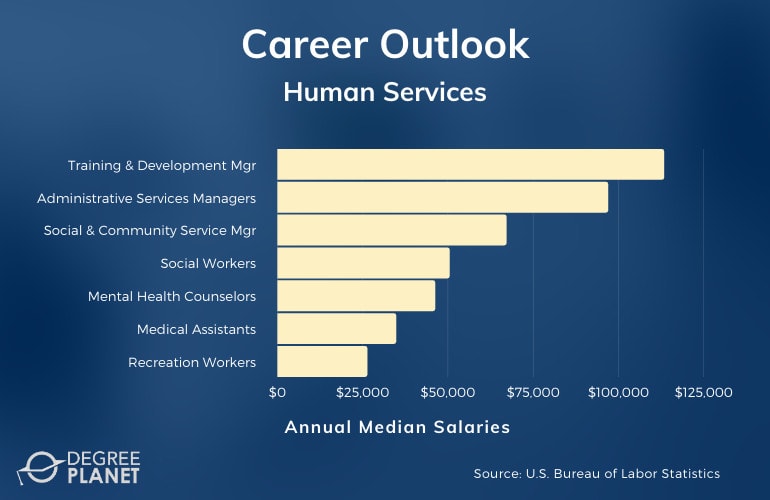What can you do with a human services degree? Getting a degree in this field can help you spend your career improving life for others.

Editorial Listing ShortCode:
Many find it to be a rewarding line of work that can make a real difference for people.
What Can You Do With a Human Services Degree?

With a bachelors degree in human services, you can pursue the following careers:
- Care Coordinator
- Case Manager
- Director of Development
- Domestic violence Counselor
- Family Services Specialist
- Grants Manager
- Intake Coordinator
- Nonprofit Program Coordinator
- Qualified Intellectual Disability Professional (QIDP)
- Social Services Director
- Social Worker
- Substance Abuse Counselor
Employers hire candidates with bachelors degrees for many of these positions, but going back to school for a graduate degree can help expand your career opportunities. A master’s degree or higher can help you become a licensed counselor, a marriage and family therapist, an occupational therapist or the director of a residential facility.
Online Human Services Degrees

If you’re looking for a career in this field, there are a number of options for earning your human services degree online.
Click on the field that most interests you to jump to that section of the guide:
Whether you prefer the interdisciplinary format of a human services degree program or the highly-specialized format of a social work degree, a number of accredited degree programs are available online.
Bachelor’s in Human Services

Sometimes, people need a helping hand. A human services program can help you learn about being part of support teams that provide assistance to others.
Your studies may include classes in psychology and human development. You may learn how to evaluate community needs, plan programs and analyze the effectiveness of your initiatives. There may also be classes on fundraising, budgeting, case management and working in multicultural settings.
Editorial Listing ShortCode:
Professionals in this field may work in health clinics, government agencies or nonprofit organizations. In an entry-level position, you may work directly with clients as a case manager or an intake coordinator. As you advance in your organization, you may shift to program development and staff supervision.
Bachelor’s in Health Services

A bachelor’s in this major can help prepare you for work in a health clinic. Even still, if you know you want a career in healthcare, you may prefer to get a health services degree.
Your lessons about supporting people’s needs will likely center around ways to do so in healthcare settings. Topics may include epidemiology, biostatistics, health law and human development. The classes may also cover health education and other community health services.
Editorial Listing ShortCode:
With this degree, you might look for work in a public health department, a doctor’s office, a nursing home or another care-focused setting. You might perform administrative duties in the office or run health-education programs for clients.
Bachelor’s in Social Work

While human service professionals often coordinate programs and run service organizations, social workers usually engage directly with clients. If you’re interested in doing individual or group work with people in need of support services, you may want to consider a bachelor’s degree in social work.
Topics of study in this degree typically include human development, domestic violence prevention, mental health studies, behavioral science and sociology. There will likely be classes on working with people one-on-one and in group settings. As you learn about case management, you may practice conducting intakes, assessments and interviews.
Editorial Listing ShortCode:
As a social worker, you might find jobs with government agencies, hospitals or residential facilities. You might be a case manager or an intake coordinator who specializes in working with children, senior citizens or people with disabilities. Getting a master’s degree might allow you to move into counseling positions.
Human Services Careers & Salaries

The field focuses on helping people. Your degree program can help you learn strategies for meeting people’s basic needs, such as mental health assessment and the prevention of domestic violence. When you join the workforce, you can put those ideas into practice.
Nonprofit and community-based organizations are common places of employment for professionals in human services. You might start as a case manager who coordinates services for clients. Over time, you may be able to move into positions with more responsibility, such as working as a director or being in charge of grant proposals.
Many government agencies have human services roles to fill. Your state’s child welfare agency might need social workers or a child welfare specialist to supervise interactions between parents and children in the foster system.
Health clinics often hire graduates in this field to provide non-clinical services. For example, you might work as an intake coordinator who records information on new patients. You might also be a care coordinator who serves as a liaison between a client’s various medical providers.

If you work with people who have disabilities, you might want to pursue certification as a Qualified Intellectual Disability Professional (QIDP). Requirements vary by state, but you may need a bachelor’s degree and at least one year of experience. This credential may help you get hired for some jobs.
If you care about helping people, then you may be interested in working as a counselor. Some states will allow you to work as a chemical abuse counselor with only a bachelor’s degree. To become a licensed clinical social worker (LCSW) or licensed professional counselor (LPC), you’ll need to pursue a graduate degree.
The Bureau of Labor Statistics has provided the following related careers and salaries:
| Careers | Annual Median Salaries |
| Training and Development Managers | $115,640 |
| Administrative Services Managers | $98,890 |
| Social and Community Service Managers | $69,600 |
| Social Workers | $51,760 |
| Substance Abuse, Behavioral Disorder, and Mental Health Counselors | $47,660 |
| Medical Assistants | $35,850 |
| Recreation Workers | $28,440 |
There are many entry-level jobs in the human services field, and a bachelors degree can help you secure those. With experience and more education, you may be able to advance into leadership roles.
Associate’s Degree in Human Services vs. Bachelor’s Degree in Human Services

An associate degree or a bachelors degree can help you get started in the human services field.
| Associate’s in Human Services | Bachelor’s in Human Services |
| Quicker way to get started with entry-level jobs | More robust preparation for entry-level or leadership roles in many organizations |
| Full-time enrollment usually takes two years or less | Full-time enrollment usually takes four years or less |
| Introductory classes like Human Development and Human Service Systems | Advanced classes like Special Populations and Human Services Administration |
| Job options include probation officer and social services assistant | Job options include case manager and director of development |
| Preparation for a bachelors degree | Preparation for a master’s degree |
Associate’s degree credits often transfer directly into a bachelor’s degree program. By earning an associate’s degree first, you may be able to cut a few years off of your bachelor’s studies.
How to Choose an Online Human Services Degree

If you’ve ever wondered how earning a college degree could fit into your busy life, online classes might be the solution you’re looking for. Even if you don’t want a fully online program, taking a few digital courses may make it easier to fit schoolwork into your schedule.
- Online Programs – In a 100% online program, you’ll take all of your courses through distance learning and interact with classmates and faculty in virtual settings. You may be able to log in at any time of day or move through the curriculum at your own pace.
- Hybrid Programs – A blended approach, hybrid programs allow you to take some classes online and come to campus for others. Often designed for working professionals, the in-person classes may be held in the evenings or on weekends.
- On-Campus Classroom – The traditional approach to college coursework involves attending classes in-person. This format can be beneficial for those who thrive on structure or face-to-face interactions.
You can get a good education through online, hybrid or on-campus classes, so select the format that works best for your learning style and your availability.
Editorial Listing ShortCode:
Whichever format you choose, it’s also a good idea to pay attention to whether a college is regionally accredited. This is a sign that you’ll earn a reliable, respected degree there. The Council for Higher Education Accreditation (CHEA) maintains a list of regional accreditors.
What Jobs Are in the Human Services Field?

When you first start working in the field, you might interact with clients regularly. You might be case a manager, an intake coordinator, a substance abuse counselor or a care coordinator. The responsibilities might include conducting interviews and overseeing care plans.
With a bachelors degree, you might also hold supervisory roles. As the director of a program or a facility, you might work behind the scenes to ensure that community members have access to the services they need.
What Is the Highest Paying Job in Human Services?
In general, the highest paying jobs for this major are the ones that involve management responsibilities. For example, training and development managers who hold a bachelors degree in the field make on average around $115,640 per year (Bureau of Labor Statistics).
Going back to a school for a graduate degree may help increase your earnings. After earning a master’s, you may be able to get licensed as a professional counselor who can meet with clients in private practice settings.
Is a Human Services Degree Worth It?

Yes, a human services degree is worth it for many students. In this line of work, you may have many opportunities to lend a hand to those who are going through tough times.
This is a growing field of employment. According to the U.S. Bureau of Labor Statistics, jobs in the community and social services sector are projected to increase at a 12% rate over the next ten years. Common careers in this category include human services assistants, social workers, community outreach workers, and substance abuse counselors.
What Can You Do With a Degree in Health and Human Services?
The field of health and human services is dedicated to helping people live full, healthy lives. You can decide whether you’d like to orient your career around health services or other essential needs.
Working in health services, you might conduct hospital intakes, lead health education programs or direct activities in a nursing home. For related careers, you could consider being a children’s social worker, a case manager for public-aid clients or a program administrator.
Is Financial Aid Available for an Online Human Services Degree?

Whether for on-campus classes or online programs, financial aid is available for accredited colleges. To learn what federal grants and loans you can receive, fill out the Free Application for Federal Student Aid (FAFSA). State aid may be available as well.
You may also be able to win scholarships from local or national programs. If selected, these monetary gifts will cover a portion of your tuition.
Human Services Professional Organizations

If you’re interested in joining a professional organization in human services for networking or professional development, here are a few options.
- American Counseling Association
- American Probation and Parole Association
- American Public Human Services Association
- International Facility Management Association
- National Association for Addiction Professionals
- National Association of Social Workers
- National Council on Family Relations
- National Organization for Human Services
Human services is an interdisciplinary field, so there are a number of professional organizations in various fields that can aid you in your career growth and development.
What is Human Services?

This field addresses human needs. Whether people have short-term or chronic struggles, human services professionals may be able to help. Offering one-on-one interventions, leading community initiatives or shaping public policies are examples that help define what a human services degree is and what you can do with it.
Editorial Listing ShortCode:
Human services endeavors are often conducted at the population-wide level. Although you might work with individuals, the overarching goal is to improve life throughout a community by implementing programs and policies that help people.
What are the Requirements for an Online Human Services Degree?
To get into an online human services bachelor’s degree program, you will fill out an application and submit high school transcripts. You may need to provide essays, letters of recommendation and standardized test scores as well.
Once admitted to your degree program, you’ll probably need to earn about 120 credit hours to graduate. Most programs are a mix of general education classes and those specific to human services. Some colleges also require an internship in a professional organization.
Getting Your Human Services Degree Online

Whether you’re brand-new to the field or want to advance your current career, an online degree in human services can help you accomplish your goals. It can help you learn more about supporting people in need and running programs that can transform your community.
You can learn to offer assistance that makes a difference by enrolling in a human services degree program. Submitting applications to online humanitarian degree programs now may be the start of a lifelong career of supporting people who need a helping hand.

